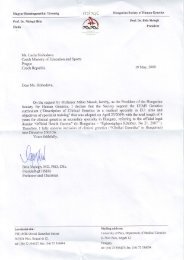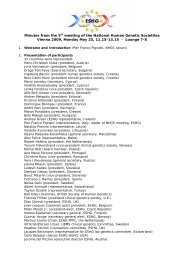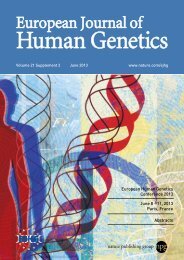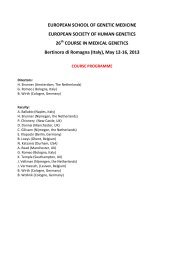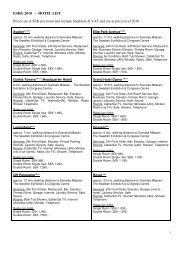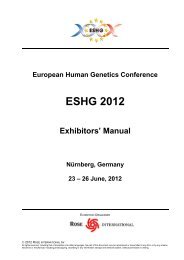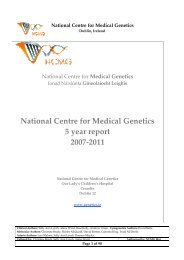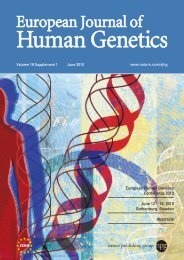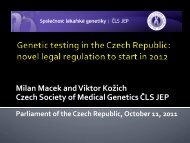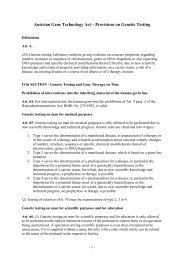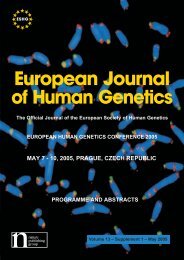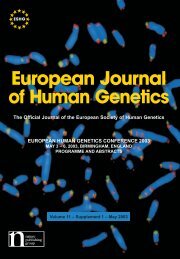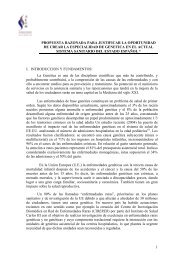2008 Barcelona - European Society of Human Genetics
2008 Barcelona - European Society of Human Genetics
2008 Barcelona - European Society of Human Genetics
You also want an ePaper? Increase the reach of your titles
YUMPU automatically turns print PDFs into web optimized ePapers that Google loves.
Normal variation, population genetics, genetic epidemiology<br />
for BRCA2 gene . We found 21 different sequence variants in BRCA1<br />
(2 novel) and 36 variants in BRCA2 gene (7 novel) .<br />
We analyzed the distribution and occurrence <strong>of</strong> sequence variants<br />
in BRCA1 and BRCA2 genes on a healthy population <strong>of</strong> women in<br />
Croatia in an attempt to distinguish non-tumorigenic from tumorigenic<br />
changes in genomic sequences <strong>of</strong> BRCA1 and BRCA2 genes . This<br />
may contribute to easier distinction <strong>of</strong> potentially dangerous from<br />
harmless changes in patients with family history <strong>of</strong> breast cancer .<br />
P07.020<br />
DNA-repair genetic polymorphisms and breast cancer risk<br />
among cypriot women<br />
M. Loizidou 1 , T. Michael 1 , Y. Marcou 2 , M. Daniel 2 , E. Kakouri 2 , P. Papadopoulos<br />
2 , S. Malas 3 , K. Kyriacou 1 , A. Hadjisavvas 1 ;<br />
1 The Cyprus Institute <strong>of</strong> Neurology and <strong>Genetics</strong>, Nicosia, Cyprus, 2 Bank <strong>of</strong><br />
Cyprus Oncology Centre, Nicosia, Cyprus, 3 Limassol General Hospital, Limassol,<br />
Cyprus.<br />
Breast cancer is the most common malignancy which affects women<br />
worldwide . In an attempt to identify genetic variants which modify<br />
breast cancer risk we are contacting a case-control genetic epidemiology<br />
study using a cohort <strong>of</strong> 2286 Cypriot women (1109 breast cancer<br />
patients and 1177 age-matched healthy controls) . In the present study<br />
we genotyped 11 single nucleotide polymorphisms (SNPs) in BRCA2,<br />
ERCC2, FANCA, MLH1, MRE11A, MSH2, OGG1, p53, RAD51 and<br />
RAD52 genes which are all involved in the DNA repair pathway . The<br />
prevalence <strong>of</strong> the 11 SNPs was compared between cases and controls<br />
. Genotype frequencies were compared across groups using the<br />
chi square test and the Mantel-Haenzel test for linear trend . The association<br />
between breast cancer and each SNP was examined using<br />
logistic regression with the SNP genotype tested under models <strong>of</strong><br />
complete dominance and recessive inheritance . Three SNPs showed<br />
significant associations with breast cancer. For the most significant<br />
SNPs, the estimated ORs were 0 .74 (95%CI 0 .59-0 .93) and 1 .41<br />
(95%CI 1 .08-1 .83) under a dominant inheritance model, with a combined<br />
Ptrend 0 .0087 and 0 .0076 respectively . These results suggest<br />
that a proportion <strong>of</strong> the SNPs under study are modifying breast cancer<br />
risk . Large numbers <strong>of</strong> samples will be needed to verify our results<br />
in other populations . We are currently expanding our analysis to include<br />
a greater number <strong>of</strong> SNPs and to evaluate potential underlying<br />
gene-gene or gene-environment interactions, in order to advance our<br />
knowledge on the effect <strong>of</strong> genetic polymorphisms on breast cancer<br />
susceptibility in Cypriot women .<br />
P07.021<br />
Variants in the vitamin D receptor gene and breast cancer<br />
E. Barroso1 , L. P. Fernández1 , R. L. Milne1 , G. Pita1 , P. Zamora2 , J. I. Arias3 , J.<br />
Benítez1 , G. Ribas1 ;<br />
1 2 3 CNIO, Madrid, Spain, La Paz Hospital, Madrid, Spain, Monte Naranco Hospital,<br />
Oviedo, Spain.<br />
Breast cancer is the most commonly occurring cancer among women,<br />
constituting 23% <strong>of</strong> all cancers . 5-10% <strong>of</strong> all breast cancers are caused<br />
by germ-line mutations in BRCA1 and BRCA2 . Multiple low-risk genes<br />
with variants common in the general population are thought to produce<br />
a mild susceptibility risk to sporadic breast cancer .<br />
The vitamin D receptor (VDR) gene is a key mediator in the vitamin D<br />
pathway, and has been <strong>of</strong> long interest in breast cancer aetiology, since<br />
vitamin D exposure has been reported to reduce breast cancer risk . In<br />
the present study we have explored the implication <strong>of</strong> VDR in sporadic<br />
breast cancer, in the Spanish population since previous studies have<br />
been done in different populations than South <strong>European</strong> ones .<br />
A total <strong>of</strong> 576 healthy controls from the Spanish population and 576<br />
consecutive and non-related sporadic breast cancer cases, collected<br />
from different hospitals in Spain, were used in this study . Genotyping<br />
studies were carried out over four SNPs within the VDR gene, located<br />
on exons, in the putative promoter region or in untranslated regions .<br />
Genotyping was performed using TaqMan .<br />
We detected associations for two <strong>of</strong> the selected SNPs: rs10735810<br />
with OR=1 .49 (95% C .I . 1 .01-2 .21; p=0 .045), and rs731236 with<br />
OR=0 .72 (95% C .I . 0 .51-1 .02; p=0 .064) . We also studied both haplotype<br />
and diplotype using PHASE v2 .0, and detected associations with<br />
disease that were considered with the genotype results . Additionally,<br />
VDR proliferation parameters such as tumor differentiation grade and<br />
tumor aggressiveness will be discussed .<br />
P07.022<br />
mutations in cARD15 and smoking confer susceptibility to<br />
crohn´s disease in the Danish population<br />
A. Ernst1 , I. S. Pedersen1 , H. Okkels1 , M. Ostergaard2 , B. A. Jakobsen1 , N.<br />
Thorsgaard3 , E. Dagiliene1 , V. Andersen2 , A. M. Drewes1 , H. B. Krarup1 ;<br />
1 2 Aalborg Hospital, Aalborg, Denmark, Viborg Hospital, Viborg, Denmark,<br />
3Herning Hospital, Herning, Denmark.<br />
INTRODUCTION: Three mutations in the CAspase Recruitment Domain<br />
gene (CARD15) predispose to Crohn´s disease (CD) in Caucasian<br />
populations .<br />
The frequencies <strong>of</strong> the three most common CARD15 mutations differ<br />
greatly between ethnic groups . Heterogeneity even exists between the<br />
<strong>European</strong> countries .<br />
AIMS & METHODS: The aim <strong>of</strong> this study was to investigate the mutation<br />
frequency in patients with inflammatory bowel disease and healthy<br />
controls in Denmark . Genotyping <strong>of</strong> the three CARD15 mutations were<br />
performed in 388 patients with Crohn´s disease, 565 patients with ulcerative<br />
colitis and 796 healthy controls using Real-Time PCR . A comparison<br />
<strong>of</strong> allele and genotype frequencies in the three groups was<br />
made . A possible additive effect <strong>of</strong> smoking on CARD15 mutations<br />
was also examined .<br />
RESULTS: CARD15 mutations were significantly more common in CD<br />
patients compared with healthy controls (21% vs . 10%; P



